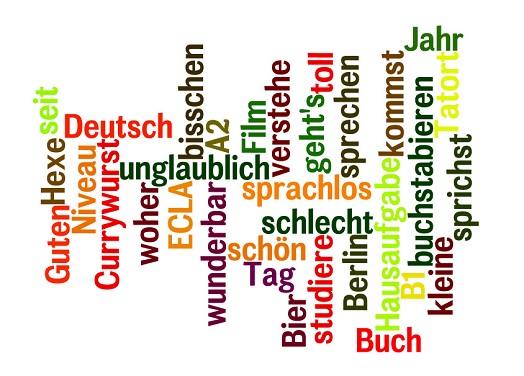Even though you can order your Currywurst in English anywhere in Berlin, learning German is important. ECLA of Bard B.A. students need to pass a test in German by the end of the second year. Moreover, learning German can help students read major philosophical and literary texts in their original version. The German Club at ECLA of Bard was initiated by David Kretz, a first year BA student and a native German speaker, in order to help students who want to improve their German. The weekly sessions of the German Club are set in an informal environment – the ECLA of Bard Student Centre – and are open to students of all levels, from beginners to proficient speakers.
The process of learning “the awful German language”- to use Mark Twain’s words – is made easier through the Club’s fun and engaging activities. David kindly agreed to tell us more about the German Club in an interview.
Diana: How did you decide to start the German Club?
David: In a meeting of the student committee we started to discuss with our Dean, Catherine Toal, the problems students have with German language. Many of them still have difficulties speaking German, even if they have been studying in Berlin for a while. The language courses at ECLA of Bard were intensified in the last year, as there are three sessions per week instead of two, but learning a language is very demanding and it requires a lot of work. So we thought that meeting in an informal setting to study German might help and, with the support of faculty and administration members, the German Club was initiated.
Diana: What are the activities that take place at the German Club?
David: One of our main activities is reading. We started with books for children because many of the students who joined the club are beginners. We read books such as Die kleine Hexe, Rotkäppchen, and Pippi Langstrumpf. We also watch German movies. We try to speak only in German, using English only when it is strictly necessary.
Our biggest event was a discussion about German beer. The event was organized by Katharina Meyer, Director of the Provost’s Office at ECLA of Bard and the main supporter of the German Club.
Students can also come to ask questions about their homework or to get help with the essays they write in German.
Diana: Are students also getting acquainted with German culture through these activities?
David: Definitely. For example, we read Die kleine Hexe, an absolute classic of German literature for children. Every German kid reads this book. The movies we watch are also very popular in Germany, for example Tatort, a famous crime series.
Diana: How do you manage to make everybody profit from the sessions, taking into account the varied levels of proficiency?
David: So far we have been pretty lucky because the differences are not very strong. Most students who attend the sessions of the German Club are between levels A2 and B1 (i.e. can communicate on familiar and routine matters), so the group is quite homogenous. We vary the texts and the things we do, so there is something for everyone.
Diana: Are the sessions complementary to what students study in class?
David: Yes, in certain ways they are complementary. The professors who teach German language at ECLA of Bard helped me a lot in designing the sessions of the German Club and had very good recommendations about which books to use. The German Club tries to create an informal atmosphere and we focus more on reading and speaking. We’re not so concerned with a strict, grammatically correct usage of the language. This was also the suggestion of the German language professors at ECLA. They teach grammar in class, and we focus on speaking, so that the students get the feeling of German.
Diana: What is the “feeling of German”? Taking into account that you are a native speaker of German and you also speak English, French, and have some knowledge of Latin, what can you say about the process of explaining German through English to students coming from various linguistic backgrounds?
David: It is sometimes difficult for me to explain things about German grammar because, as a native speaker, I have an intuitive knowledge of the language. I would say that German is semantically dense: every word can have several meanings and it all depends on the context. That is one of the reasons why translating is quite difficult, especially when it comes to philosophical texts. We do a lot of translations at the German Club. Usually, after reading a few paragraphs from a text, we translate it.
Diana: From your experience with students who are learning German, what are the most difficult aspects of learning German?
David: Most people struggle with the articles because there are no clear rules. Also, the word order – it takes a lot of time to learn where to place verbs.
Diana: The ECLA student body is comprised of students who speak about 20 different languages overall. Who do you think learning German is the most difficult for?
David: It might be easier for westerners because some German words are close to English. It might be difficult for people who speak languages in which you don’t have cases or tenses (like Thai). But I think it helps a lot that everyone here speaks English, so any student can relate to German through English.
Diana: What are your plans for the next sessions?
David: For the next weeks we plan on discussing Hannah Arendt’s book Eichmann in Jerusalem, as part of the preparation for ECLA of Bard’s upcoming conference Judgment in Extremis, a conference inspired by the fiftieth anniversary of the book. Our long term plan is to have more movie screenings and introduce new events: invite people who had a successful learning experience and talk about the way they studied German, and also organize some trips in Berlin.

